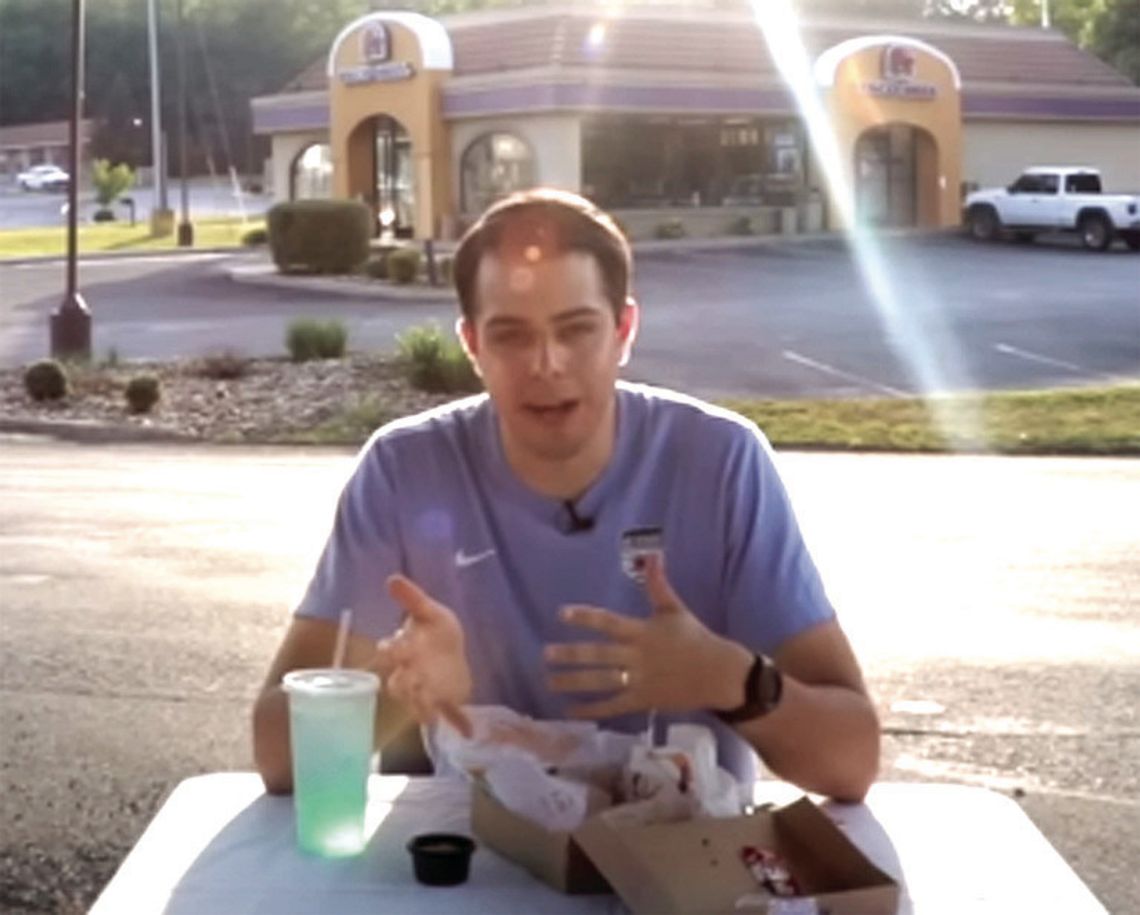From July to August last summer, Lexington-based YouTuber Sam Reid didn’t open his fridge a single time – when hunger struck, it was off to the drivethru. As a self-described “Taco Bell enthusiast,” Reid said he was curious to see if eating exclusively from the restaurant for a month would have any major effects on his health.
Reid’s documentary, aptly titled “I Ate Nothing But Taco Bell for 30 Days to Improve My Health,” premiered on YouTube in October of 2022, when Reid said he had around 2,000 subscribers.
Views and subscriptions slowly climbed until an exponential increase in January 2023 after Reid posted a short recap of his experiment on Instagram that amassed over 10 million views. Today, the documentary has over 1 million views and the channel has about 30,000 subscribers, according to channel analytics. Reid said his motivations for making the documentary came from a mix of curiosity and personal enjoyment.
“It was partly because of my love for Taco Bell,” Reid said. “And partly because of these articles that I was seeing about Taco Bell being one of the healthiest fast-food restaurants. It felt like a perfect combination of like, passion, with this concept of testing whether that claim was true.”
Reid said the recent spike in attention caught the eye of Taco Bell CEO Mark King. King, who could not be reached for comment, invited him to their Irvine, Calif., headquarters in March. Reid said he sampled unreleased menu items and appeared on King’s podcast, “Taco Bell’s Recipe For Restless Creativity.”
For the documentary to gain traction at this level, it had to be well-researched.
Reid said he was careful to consult with multiple healthcare officials, getting bloodwork and body composition scans before and after the experiment. He said he carefully considered what kind of message on wellness his final product would impart to his audience.
“Going into making the documentary, I wanted to be really thoughtful about how I talked about health. I know how difficult a topic that can be for some people,” said Reid. “The statistics around eating disorders and distorted self-image are a lot higher than people realize.”
In the 30-minute film, posted to Reid’s channel, The Studio Revue, Reid said he would have at least three meals a day exclusively from Taco Bell, food and drink, and would try each menu item at least once, coupled with regular exercise.
At the end of the experiment, Reid said his cholesterol went down by about 50 mg, his body fat percentage decreased by 2 percent, and he lowered his 1-mile run time by 20 seconds. Reid said most other statistics stayed the same and those that increased remained well within the healthy range.
By no means does Reid advertise the diet as a sustainable option. In the documentary, Reid details his struggles with the challenge, including indigestion and other stomach issues. Reid said he found it difficult to keep his sodium intake low, as certain menu items contained the recommended daily limit. As well, Reid said a month’s worth of Taco Bell ran him over $700, compared to the average $300-per-person cost of groceries in Virginia, per an ABC 13 report.
Reid also said the undertaking impacted his social life.
“I feel like logistically, having to go and grab something through the drive-thru every single meal was just kind of a hurdle to overcome,” Reid said. “I feel like it was tricky explaining to folks that didn’t know what I was doing, why I wasn’t eating at their house or something like that, or why I brought my food.”
Reid’s friends weren’t the only ones confused. The employees of Lexington’s Taco Bell chuckled when Reid was brought up during a recent interview. Assistant Manager Anthony Staten said they were initially startled to see him so frequently.
“Sam’s a pretty cool dude. He’s really doing his own thing,” said Staten. “We didn’t really know what was going on at first, just that he would show up every day and eat certain foods.”
Reid also interviewed Taco Bell’s Director of Global Nutrition Missy Schaaphok about the company’s health initiatives. Schaaphok said Taco Bell continues to make progress towards better nutrition.
“We’ve been on a long journey of reducing sodium, cleaning up our labels, getting rid of artificial colors – we got rid of trans fat,” Schaaphok said in the documentary. “It’s quite an extensive process, but we do it right and we do a lot of testing, and that’s why it takes a lot of time.”
As Reid began to advertise his then-upcoming experiment, he was interviewed by local news, at which point outlets like Fox, Inside Edition, and Newsweek picked up the story. “Tonight Show” host Jimmy Fallon even cracked a joke about Reid in his nightly monologue.
“Taco Bell is so excited! They’re like, ‘he called us food!’,” said Fallon.
Reid said the buzz and internet commentary compelled him to work harder.
“I think the media attention encouraged me to make the best quality product that I possibly could,” said Reid. “Some of the comments opened my eyes to things that I wanted to then address in the documentary.”
Reid didn’t always plan to enter the public eye. While studying classics at the University of Virginia and working for non-profit organizations after graduation, Reid said he was unaware that making YouTube videos could be a regular source of income.
“I guess I didn’t really have any framework for the fact that you can make a career out of YouTube,” said Reid. “When I saw people have these viral videos, and then turn it into kind of a job, I was really confused.”
Reid’s first taste of fame came from a video he made in college (a picture-every-day time lapse) when it was featured on The Today Show. Reid said he formally began attempting to profit from YouTube a few years later, at the start of the COVID-19 pandemic.
Today, Reid works part-time at Season’s Yield bakery, having lived in Lexington since moving with his wife in January 2021. Reid says his newfound revenue from YouTube will allow him to steadily shift away from other work until it can support him full-time. He said living in Lexington affords him nearly the same amenities as New York City or Los Angeles would to have a successful content-creating career.
“The cool thing about You-Tube is that you can really do it from anywhere,” said Reid. “I like being able to travel for videos, but most of the things that I’ve needed to do are pretty close by.”
Going forward, Reid said he wants to give his subscribers a wide variety of content. His latest video sees him explore the urban legends of the Denver Airport. He said his video-making process comes purely from what inspires him.
“I want to hold off on backing myself into a corner with just fast food or just travel or something like that,” said Reid. “I would describe what I do as more of a variety show. It helps me to continue making content that I’m excited about, because I don’t feel like boxed in by one specific category.”




